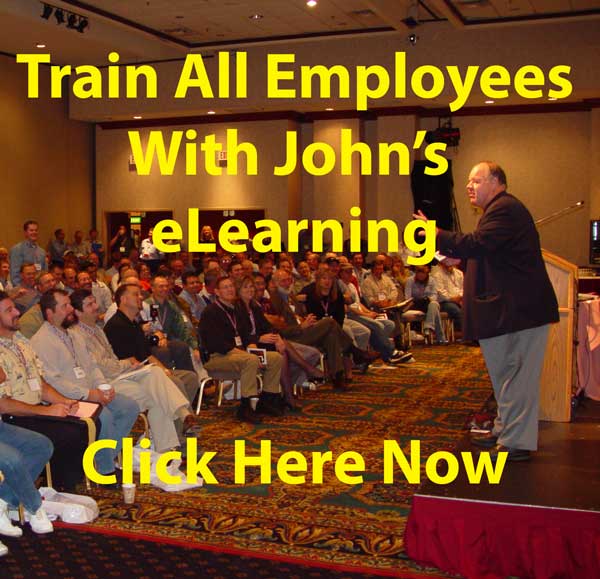Safety Speakers Tip – Conveying The Importance of Stop Work Authority
Safety Speakers Tip – Stop Work Authority
Not many safety speakers are able to customize their presentation to your specific needs. Many of my clients ask me to include in my presentation a discussion of stop work authority. As a result I have written specialized content to cover this issue. In order for employees to take action and stop work when they are concerned, they must have complete confidence they will be supported by management. Do they believe everyone from their first line supervisor to the top person in the company will thank them for their decision to make sure the job is safe? If they don’t have this belief, then it is unlikely they will stop a job even if they notice something wrong. This makes perfect sense because even when there are unsafe conditions an incident doesn’t always occur. If they believe their leadership might criticize their action they might choose to not take action. Make sure your top leadership has instilled the importance of stop work authority all the way down to the first line supervisors.
Two Outcomes Of Stopping Work
When someone stops a job to make sure everything is safe there are two typical outcomes. One is a hazard is found, which could have caused an injury. The other is the job was, in fact, safe and there was no hazard to fix or mitigate. In the first case, the response of everyone including the leadership is likely to be positive. After all, a problem was found. The positive consequences are immediate. In the second case, it is even more critical that leadership praises the person’s commitment to safety. Safety speakers must help companies convey this concept. Because in the second instance, no hazard was found so people can mistakenly feel they stopped the job for nothing. The reality is you stop the work because of a suspected problem rather then a real problem. Acting on the suspicion that something is wrong is what we really need to praise.
How Important Is A Proper Response to Stop Work?
For safety speakers there are great opportunities to teach safety principles. They can be found on the job and off the job. I bet you never thought of stop work authority as something which could be illustrated by something in your personal life.
Just last week, something happened which caused me to stop what I was doing to make sure something was safe. My wife had left a few minutes ahead of me for church, as she stops to get coffee at her favorite place. The night before, we had our grandkids over so their parents could participate in a Shamrock Run early in the morning. On the way to the coffee shop, she began to wonder if she had turned all the burners off on the stove after finishing pancakes for the kids. At the coffee shop, she called me. I was loading my grandson, Owen, in the car when she called. I had already locked up the house and was just about to leave. I answered the phone and she asked me if I could go back in the house and check to make sure the stove was off. I went back, opened the house, and Owen and I checked the stove. It was fine; every burner was off. I called her back and reported that all was safe. I stopped my job of getting Owen and I to church to check out her concern. Obviously, this isn’t as big a deal as stopping an industrial job or project; however, it illustrates a point very clearly. Before she left the coffee shop she had heard back from me all was well. Her response was apologizing for putting me out of my way to check it. Wow, she felt bad that nothing was wrong! I wondered how bad someone might feel that stopped work and caused an entire crew to have to wait to see if it was safe to proceed only to discover there was no problem.
First, we must remember the desired outcome or behavior is the person taking action to stop work to find or eliminate any hazards, not actually finding any problem. We want to recognize the person taking that action.
I said to her, “Thank you for keeping the safety of our home first by asking me to check it out.” I also told her I appreciated it that she felt comfortable enough to ask me to stop what I was doing to carry out the safety task. The fact that she apologized and told me she felt bad made it clear that praising her was all the more important. It is important to be pleased with our selves when we take this action alone even if no one else is on the job. In this case, had she not caught me before I left she would have gone back and checked on her own. Effective safety speakers know how to make employees feel good about stoping work for a safety issue and teach others the best way to respond.
Rehearse and Plan Ahead For Effective Communication
How many times after you talk with people do you find yourself thinking, “I wish I would have said…”? After the conversation, you have time to think about it and your mind comes up with many other things you could have said or done. This is why you hear people say hindsight is 20/20. You can have the advantage of hindsight ahead of time. The way you accomplish it is to plan ahead.
Safety speakers and others call it rehearsal, for you it’s just being prepared. Before you find yourself in a situation where you are thanking someone for stopping a job, think about what you would like to say. Think of something for both situations, one where something was found and one for when everything was fine. Say it out loud and or write it down. Now set it aside. Here is where your mind will come up with a better way to say it just as it would after you talked with someone. The difference is, you have had the advantage of reflection ahead of time not just after the fact. Mental rehearsal, which is what this is called, can be very effective. Remember to recognize people privately unless you have their permission. Some people hate public recognition and this turns a positive to a negative for them.
Companies will have higher-level leaders involved when an injury occurs. Be proactive and involve them when someone stops work to prevent an injury. A thank you from someone in upper level management can be very powerful. Delegate this one upward instead of normally delegating something downward.
It seems to me as we become safer and safer, the time will come when most of the time when we stop work we will find everything is fine. That will make it all the more important to be vigilant and stop when anything seems unsafe.
Consequences Sure and Certain
Many of you have heard consequences are most influential on behavior when they are sure, certain and soon. It is amazing to me how many safety speakers get this one wrong. The key driving factor is sure and certain. Soon is nice but not necessarily a key motivator. You know if you go through certain apprenticeship programs you are certain of making more money. People go to medical school knowing the payoff will be there at the end. When it comes to stop work authority you have to ask yourself if your employees are sure and certain of the positive consequences of taking action. The challenge is do you provide enough positive consequences when there was no danger?
Solutions For Your Safety Challenges
When you need solutions for your safety challenges give Diane Weiss a call at 209-745-9419 and bring John to your site to discover injury preventing solutions. The stop work authority topic can be easily added to any of John’s presentations. You can email her at diane@drebinger.com
Until next week,
I’ll be, “Watching Out For Everyone’s Safety™”
John
© 2017 John Drebinger Presentations
Permission to use granted when credited and contact information included. www.drebinger.com +1 209.745.9419







Leave a Reply
Your email is safe with us.